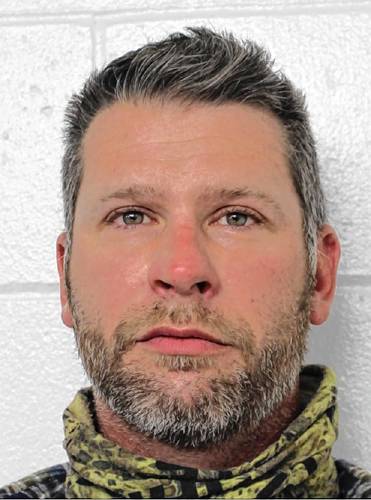By DAMIEN FISHER, InDepthNH.org
It’s not against the law to harass an ex-girlfriend online and threaten to release embarrassing photos of her unless she agrees to lie to your wife, according to Lebanon District Court Judge Michael Garner.
Garner dismissed the criminal stalking charges against former Lebanon Police Lt. Richard Smolenski, finding that Smolenski never threatened any actual physical harm to his ex, Grafton County Corrections Officer Nicole Cremo.
“I find and rule, however, that the State could not prove that these communications were ‘true threats,’ and that no finder of fact could find beyond a reasonable doubt that these statements would cause a reasonable person to fear for their own personal safety,” Garner wrote in his Jan. 5 ruling. “Although the Court is therefore bound to dismiss the Complaint, this Order should in no way be interpreted as an approval of the actions alleged in the Complaint.”
Belknap County Attorney Andrew Livernois told InDepthNH.org on Tuesday he has not reached a decision on whether or not he will appeal Garner’s ruling.
“We haven’t had a chance to study the opinion,” Livernois said.
Livernois’s office took over the prosecution from the Grafton County Attorney in order to avoid a conflict of interest.
Smolenski’s lawyer, Anthony DiPadova, told InDepthNH.org that even if Smolenski’s anonymous online threats against Cremo were proved in court, they never violated New Hampshire’s stalking statute and are therefore protected under the First Amendment.
“This has been my opinion on the case from the beginning, that even if all the allegations are true, it does not constitute stalking,” DiPadova said.
Smolenski was charged with a misdemeanor under New Hampshire RSA 633:3-a, I (a),which defines criminal stalking as when a person “Purposely, knowingly, or recklessly engages in a course of conduct targeted at a specific person which would cause a reasonable person to fear for his or her personal safety or the safety of a member of that person’s immediate family, and the person is actually placed in such fear.”
Smolenski is never accused of threatening physical harm. While he was accused of causing Cremo to fear for her safety, the specific allegations in charging documents state that Smolenski sent Cremo “a series of anonymous messages from fictitious accounts threatening to release embarrassing photos and information of her to her boyfriend, her boss, County Commissioners or anyone he chooses, if she did not agree to send a message to Defendant’s wife denying their prior relationship.”
While Garner accepts Cremo was placed in fear by Smolenski’s threat to release the photos and information, he ruled the state cannot prove these were “true threats” that cause fear for personal safety.
New Hampshire law allows communication that “annoys or alarms.” Stalking requires that these communications take the next step to placing the victim in “fear for their personal safety,” Garner ruled.
DiPadova said there is no allegation Smolenski ever made a “true threat,” which would place the intended victim in fear for their personal safety. Without that threat, Smolenski’s communication with Cremo is protected speech, he said.
Smolenski was fired from the Lebanon Police Department in 2021 after he was charged. He was originally placed on leave in 2020 and investigated for almost a year. Smolenski had risen to become the department’s prosecutor before he was terminated.
Smolenski, who was married at the time, had an affair with Cremo which ended in 2020. After Smolenski’s wife found an intimate photo of Cremo in his email, he contacted Cremo and demanded she lie about their relationship, according to the original arrest affidavit.
When Cremo refused, Smolenski began sending messages demanding that she lie to his wife, or he would release intimate photos of her, according to the affidavit. Smolenski threatened to contact her family, her employers, and the Grafton County Commissioners if she did not comply. Cremo told investigators she feared Smolenski, a veteran law enforcement officer who had also served in the military, according to the affidavit.
During his alleged campaign of harassment, Smolenski used multiple social media accounts to target Cremo. At one point he allegedly created an account using Senior Officer Paul Gifford’s identity in order to continue harassing Cremo on social media, according to the affidavit.
Smolenski and Gifford ended up suspended from the department for months before Smolenski was charged and Gifford cleared.
Grafton County officials spent $9,000 investigating Cremo after learning of the alleged affair between her and her supervisor in 2021. The report from that investigation has not been released to the public.
Smolenski’s certification to be a police officer in the state of New Hampshire was suspended by the New Hampshire Police Standards and Training Council pending the outcome of the court case. Without the charge, Smolenski is free to apply to be reinstated as a police officer.
DiPadova told InDepthNH.org he’s not sure what Smolenski plans to do next.
Smolenski’s currently central to the federal civil rights lawsuit brought by Scott Traudt. Vermont resident Scott Traudt had his assault conviction overturned last year based on evidence the Lebanon Police Department hid exculpatory evidence on former Smolenski, and current Chief Phil Roberts.
Smolenski had been disciplined for conducting an affair on department time months before Traudt’s 2007 arrest. Roberts was subject to a criminal investigation while he was a Vermont police officer before taking a job in Lebanon, though he was never charged with any crime.





